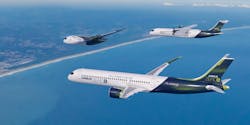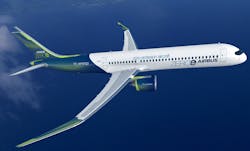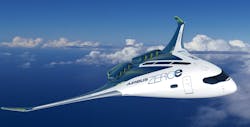Airbus Exploring Hydrogen-Powered Aircraft for 2035
On Monday, September 21, Airbus SE released designs for hydrogen-powered aircraft it says could take to the skies as soon as 2035.
Airbus’ three proposed designs would be powered by modified gas-turbine engines that would burn liquid hydrogen as fuel instead of petroleum-based fuel in addition to hydrogen fuel cells that would “complement” the hydrogen gas-powered turbines. In a statement, Airbus noted that each of the three designs has a “slightly different approach” to how they would store the liquid hydrogen.
The concept planes, which Airbus collectively refers to as “ZEROe,” feature profiles that range from a normal commercial aircraft with elongated wings, a turboprop plane featuring prominent propellers, and a futuristic “blended wing” design.
In a statement, Jean-Brice Dumont of Airbus EVP Engineering explained that the unusual designs are meant to accommodate the concept of storing liquid hydrogen.
“Hydrogen has a different volumetric energy density than jet fuel so we have to study other storage options and aircraft architectures than existing ones,” he said. “This means the visual appearance of our future zero-emission aircraft will change.”
“As recently as five years ago, hydrogen propulsion wasn’t even on our radar as a viable emission-reduction technology pathway,” said Glenn Llewellyn, Airbus’ VP of zero-emission aircraft, but “convincing data from other transport industries” caught the company’s attention. Automakers like General Motors, Hyundai, and Toyota include hydrogen-powered vehicles, especially trucks, in their own plans to reduce fleet reliance on carbon-based fuel.
In order to meet their goal of launching a zero-emission commercial aircraft by 2035, Airbus says it aims to launch the program by 2025 and produce a full-scale prototype by the late 2020s.
According to the Agence France-Presse, aviation contributes up to 3% of world carbon dioxide emissions. The French and German governments have both earmarked billions of euros to invest in carbon-free aircraft design.
About the Author
Ryan Secard
Associate Editor
Ryan Secard joined Endeavor B2B in 2020 as a news editor for IndustryWeek. He currently contributes to IW, American Machinist, Foundry Management & Technology, and Plant Services on breaking manufacturing news, new products, plant openings and closures, and labor issues in manufacturing.


